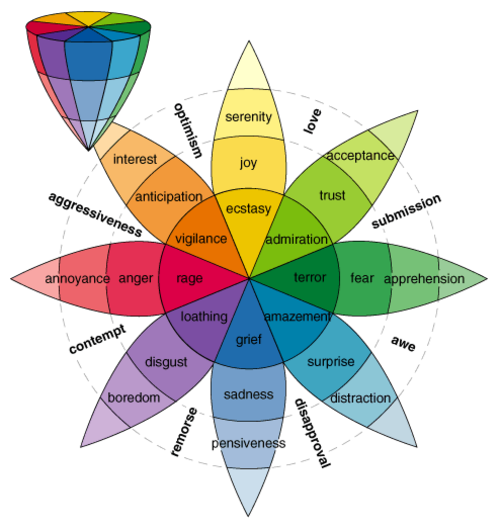
American culture is one of repression (among others). And the Church is sometimes
even worse. Most my life I have practiced
not expressing my feelings openly. Crying, anger, laughter, excitement even sarcasm are often 'hushed' as children, by parents and authorities. I have even heard from the pulpit that anger is a sin. In turn, it seems now that I am older when I do let these emotions out, I feel overwhelmed, and others are confused, or react to what they see as an 'overreaction' on my part. They just don't know all the feelings going into that one situation. So again it is easier to keep those things to myself, ignore, stifle, or 'repress' those emotions. However as the illustration above depicts: just because I 'feel' powerless over my emotions doesn't mean I am.
There are those that theorize that all emotional illness is sourced in repressed or unexpressed feelings.
Knowing that I can choose to change, or 'shift' how I feel once an emotion is expressed or externalized, gives me more courage to openly respond in a healthy way.
Learning to respond as opposed to reacting, ignoring, or manipulating is new territory for me. Today I feel hurt, scared, and sad. In saying that I immediately want to explain why. However, rationalizing my feelings puts me in my 'head' and becomes another way to avoid pain. And 'plugs' or stops me from 'shifting' to a new emotion if I choose. It also seems that in labeling the source of those feelings, I can take current circumstance or situations and force them as headings over those emotions. Often when looking deeper they were related to other unrelated or distantly related circumstances or situations. But I can only look deeper if I 1) Take the time, 2) Accept those feeling 'as is', no question asked 3) Refrain from passing judgment about their source.
I find that the book of Psalms written by King David to be a meditative discourse on those inward emotions and his process of 'shifting', and a template for positive 'self talk'. (note: 5 chapters a day out of 150 = Psalms read in one month. My Dr.Bronner moment)
Psalm 4 says:
"Be angry and do not sin, meditate on your bed and be still."
in Psalms 5:6 David speaks of evil doers as bloodthirsty men who speak lies, and then in verse 7:
"But as for me, I will come into your house in the multitude of your mercy; In
fear of
You I will worship toward your holy temple..." So see how he has realized his fear of those persecuting him and then acknowledged that he is no different then them, other then that he seeks God's mercy, and then 'shifts' his fear to the true threat which is God's judgment?
 The emotion cone, an interesting visualization. I think often times I miss the subtleties of emotions and go for the basic, mad, happy, sad labels. So this is a welcomed reminder of some of the other shades of feeling that exist.
The emotion cone, an interesting visualization. I think often times I miss the subtleties of emotions and go for the basic, mad, happy, sad labels. So this is a welcomed reminder of some of the other shades of feeling that exist.